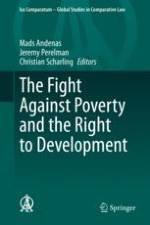2021 | OriginalPaper | Chapter
6. The Fight Against Poverty and the Right to Development: The Ghana National Chapter
Author : Raymond A. Atuguba
Published in: The Fight Against Poverty and the Right to Development
Publisher: Springer International Publishing
Activate our intelligent search to find suitable subject content or patents.
Select sections of text to find matching patents with Artificial Intelligence. powered by
Select sections of text to find additional relevant content using AI-assisted search. powered by
